News
2019 will always be remembered for Easter Sunday tragedy
View(s):The year 2019 was marred by the worst terrorist attack in Sri Lanka since the end of the three-decade-long war against the LTTE–The Easter Sunday bombings.

St. Anthony's church at Kochchikade in Colombo was one of the targets of terrorists on April 21 Easter Sunday
The Easter Sunday terror attacks left 268 dead. The bombers, who were all part of the National Thowheed Jamaath (NTJ), carried out a coordinated series of suicide attacks on churches and five-star tourist hotels. At least 40 foreign nationals and 45 children were among those killed.
St Anthony’s Church in Kochchikade, St Sebastian’s Church in Katuwapitiya and Zion Church in Batticaloa along with hotels Shangri-La Colombo, Cinnamon Grand and The Kingsbury were targeted by a group of seven bombers led by NTJ leader Zahran Hashim.
An eighth bomber blew himself up later at the Tropical Inn in Dehiwala after his attempt to detonate his explosives at the Taj Samudra hotel in Colombo failed. Later that day, a pregnant female suicide bomber, identified as the wife of one of the Shangri-La bombers, killed herself, her three children and three police officers when police raided their house in Dematagoda.
The Islamic State (ISIS) claimed ownership of the attacks, identifying the bombers as their “soldiers.” A video of the bombers pledging allegiance to then ISIS leader Abu Bakr al-Baghdadi emerged but ISIS’s direct involvement in the attacks continues to be a matter of debate.
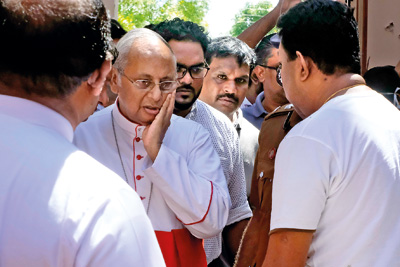
A shocked Cardinal Malcolm Ranjith urged the Catholics to exercise restraint in the true spirit of Easter
Investigations showed that the bombers were mostly educated young men from middle and upper middle class families enticed by Zahran Hashim’s extremist teachings. Police and security forces later thwarted a “second wave” of planned attacks when they recovered a large amount of explosives and bomb-making material during raids conducted in Sainthamaruthu and Samanthurai in the Eastern Province. Several terrorists were shot dead and others blew themselves up along with their family members when security forces raided their safe house.
The Government imposed a nationwide state of emergency on April 22. It lasted four months till August 23. During this time, access to social media was briefly restricted while full-face coverings were banned under emergency regulations, affecting those adopting Islamic burqa and niqab.
In May, there was a series of violent attacks targeting the Muslim community. One died and several were injured, in addition to widespread property destruction. The worst incidents were in areas such as Kuliyapitiya and Minuwangoda.
Allegations spread of certain Muslim politicians in the Government having connections with the bombers. The United People’s Freedom Alliance even tabled a no-confidence motion against the then Industry and Commerce Minister Rishad Bathiudeen.
Opposition MP Ven Aturaliye Ratana Therastaged a brief “fast-unto-death” demanding the resignation of Bathidueen, Western Province Governor Azath Salley and Eastern Province Governor A L A M Hizbullah for alleged extremist ties. All three later resigned, prompting all Muslim MPs in Ministerial positions to step down in solidarity.
Former President Maithripala Sirisena first appointed a three-member committee to look into the attacks. Parliament later constituted a Parliamentary Select Committee for the same task. A third five-member committee set up by Mr Sirisena continues its own investigation under the new President Gotabaya Rajapaksa. Meanwhile, former Defence Ministry Secretary Hemasiri Fernando and former Inspector General of Police Pujith Jayasundara are still in remand custody over their alleged role in lapses that led to the attacks.
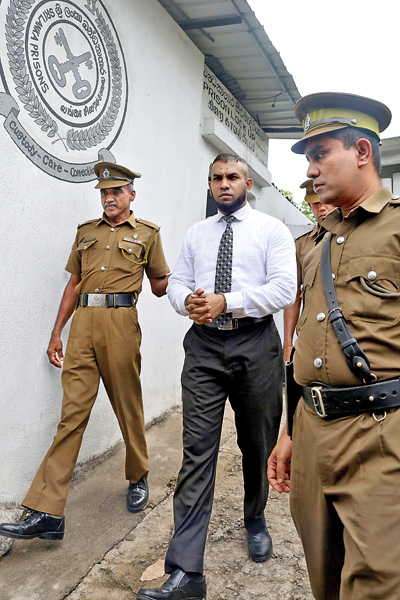
The case against Dr. Shafie continues
Presidential election and legal matters
The November 16 Presidential Election, the UNP’s internal crisis and a string of court cases were among the other highlights of the year.
Gotabaya Rajapaksa from the Sri Lanka Podujana Peramuna (SLPP) recorded 52 per cent of the vote against his main rival Sajith Premadasa of the New Democratic Front (NDF) who secured only 42 per cent of the vote.
With the announcement of the results, the single term of former President Maithripala Srisena who assumed power on January 8, 2015, also came to an end.
The election run-up generated interest with doubts over the candidacy of President Rajapaksa due to his US citizenship issue. Meanwhile, the UNP delayed naming Mr Premadasa as the candidate.
But the SLPP took an early lead by nominating Mr Rajapaksa on August 11. The factions backing Mr Premadsa held a rally in Badulla the following day, calling for his naming as the UN’s Presidential candidate. Nevertheless, it was only six weeks later that the party’s Working Committee announced him the NDF’s choice. JVP leader Anura Kumara Dissanayake came into the fray on August 18 as the candidate for the National Peoples’ Power.
On September 18, the Elections Commission announced the date of the Presidential Election and set the nominations date as October 7. A record 35 including former Army Commander Lt Gen Mahesh Senanayake were among those who applied.
Despite the Elections Commission’s repeated attempts to have the long overdue Provincial Council Elections held during the year, political parties didn’t reach consensus.
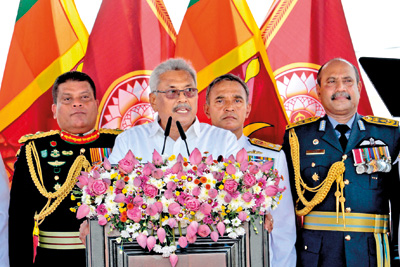
Gotabaya Rajapaksa makes his maiden speech as President of Sri Lanka
In February, former President Sirisena announced that he would re-implement the death penalty for those convicted of narcotics-related offences, but ended his term granting a presidential pardon for the convict in the Royal Park murder case.
The sentencing on December 19 of Former President’s Chief of Staff I H K Mahanama and former State Timber Corporation Chairman Piyadasa Dissanayake after being found guilty of bribery charges was among the highlights in the legal filed. Mahanama received 20 years rigorous imprisonment and a fine of Rs 65,000 as well as a penalty of Rs 20 million. Dissanayake got 12 years rigorous imprisonment and a fine of Rs 55,000.
The arrest of former Minister Champika Ranawaka on December 18– and subsequent court decision to grant bail–over a 2013 vehicle accident were among cases drawing public attention, along with this week’s arrest of former Minister Dr Rajitha Senaratne.
On January 29, Former Minister Johnston Fernando was acquitted from the case filed against him for failure to declare assets and liabilities while serving as a Minister in 2010.
A case filed against Dr Shafi Shihabdeen of the Kurunegala Teaching Hospital for allegedly amassing assets through suspicious means, having links to terrorist activities and performing illegal sterilization surgeries divided the country. The matter is ongoing with a new CID team assigned to handle the investigation.
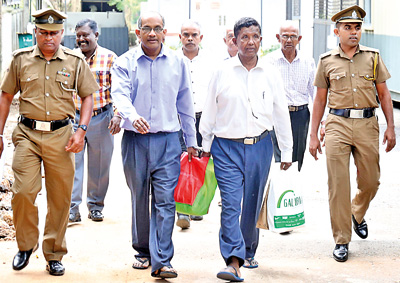
Former President’s Chief of Staff I H K Mahanama and former State Timber Corporation Chairman Piyadasa Dissanayake were found guilty of bribery charges
Several other court cases related to major investigations–including the murder of Lasantha Wickrematunga, suspected murder of Wasim Thajudeen, abduction of Journalist Keith Noyahr, shooting incident of protestors at Weliveriya, and the riot at Welikada prison–were taken up during the year, but none of them have been concluded.
Soon after the Presidential Election, the Special High Court Trial-at-Bar acquitted President Rajapaksa from the case in which he was charged with misappropriating Rs 33.9mn in public funds for construction of the D A Rajapaksa Museum and Memorial in Medamulana.
This was a result of the Attorney General holding that the Constitution prevents civil or criminal proceedings from being instituted or continued against a President in respect of anything done or omitted to be done by him, either in his official or private capacity.
The country lost some prominent politicians and personalities during the year. Former Prime Minister D M Jayaratne passed away on November 19 followed by former Ratnapura District MP Ranjith Soyza on December 4 and ex-Matara district MP Justin Galappatti on December 24. On August 5, Kurunegala District MP Salinda Dissanayake died followed by former Minister Chandrasiri Gajadeera on September 6. Prof Carlo Fonseka and scholar Vini Vitharana also passed away during the year.
The opening of the Lotus Tower on September 16 and of the Kadawatha – Kerawalapitiya Outer-Circular road days before the Presidential Election count as development highlights. The Chinese-built Colombo Port City was declared open for investors on December 9.
Parliament
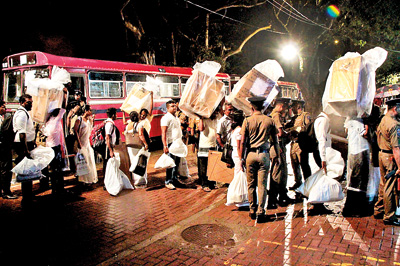
Nov.16 polls: Ballot boxes being taken to counting centres
The legislature entered a new era this year with media given access to areas hitherto restricted to them. This led to far greater public interest and engagement in what transpires in Parliament.
The Parliamentary Select Committee (PSC) looking into the Easter Sunday attacks became the first PSC in history to open its doors to journalists. Intense public outrage and international scrutiny in the wake of revelations that repeated warnings had a hand in compelling parliament to inject transparency into PSC sessions.
But the PSC had its own difficulties. Despite all parties in Parliament having called for it to be appointed, bitter divisions over its scope and questions over its independence led to the United People’s Freedom Alliance, then in Opposition, to boycott the process and refuse to nominate members to it. Only Government and Opposition MPs from the JVP and TNA served on the PSC. It sat from May to October.
With few exceptions, the PSC questioned a large number of high-profile witnesses in full glare of the media. They included then Prime Minister Ranil Wickremesinghe, then State Defence Minister Ruwan Wijewardene, then Industry and Commerce Minister Rishad Bathiudeen, then Law and Order Ministers Sagala Rathnayaka and Ranjith Madduma Bandara. President Maithripala Sirisena gave evidence at a closed-door session insisting that he would not testify as it was biased.
The PSC report, released in October, blamed a wide array of individuals for failures in the lead-up to the attacks, notably the then Director of the State Intelligence Service (SIS) Nilantha Jayawardena, then Defence Ministry Secretary Hemasiri Fernando and then Inspector General of Police Pujith Jayasundara. Mr Sirisena, Mr Wickremesinghe and Mr Wijewardene were also named.
Following on from the PSC and in response to appeals from several MPs, Speaker Karu Jayasuriya then opened up the proceedings of Parliament’s Committee on Public Enterprises (COPE) and Committee on Public Accounts (COPA) to the media. These proceedings, too, generated interest, particularly as gave exposure to corruption and waste in Government bodies.
The consequences of the 2018 Constitutional crisis carried onto this year as with Finance Minister Mangala Samaraweera presenting his 2019 Budget to Parliament on March 5. The Government was prevented from having it as scheduled last year. The third reading of the 2019 Budget was passed on April 5 with 119 votes in favour and 74 against.
By a vote of 119 to 92, the Government of Prime Minister Ranil Wickremesinghe also survived a no-confidence motion against it by the JVP in the aftermath of the Easter Sunday attacks.
This year was also notable for actions not taken. In its report to the Speaker in February, a special committee that probed violent clashes in Parliament between MPs during last year’s Constitutional crisis recommended action against as many as 59 Parliamentarians. It said the incident had caused damages of to Rs 325,000 to Parliament property. But not a single MP has so far been disciplined.
Newly-elected President Gotabaya Rajapaksa prorogued Parliament on December 2. It will now meet for the New Year on January 3, 2020.
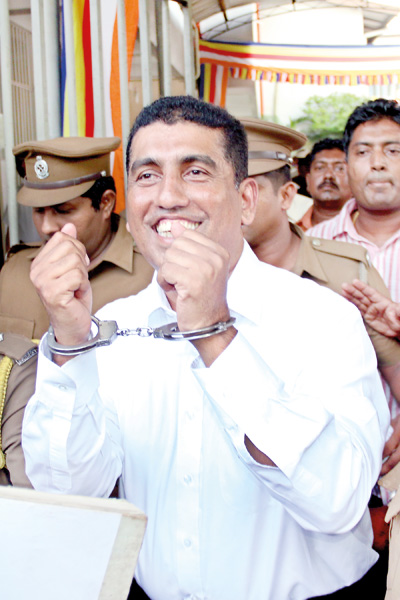
Johnston Fernando: Acquitted
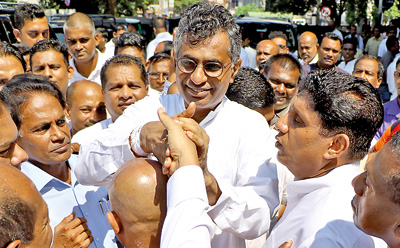
Champika Ranawaka: Arrested and given bail
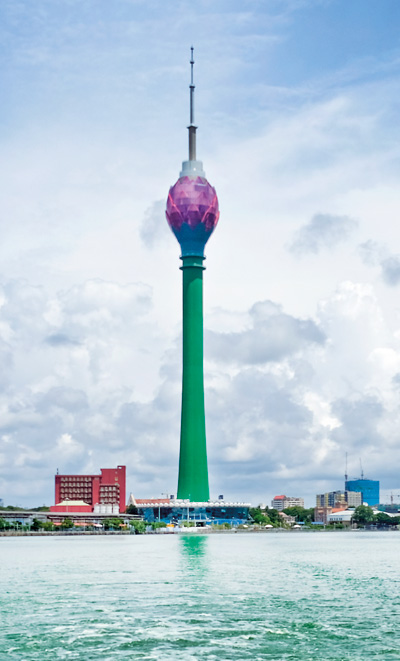
Nelum Kuluna: South Asia's tallest tower

